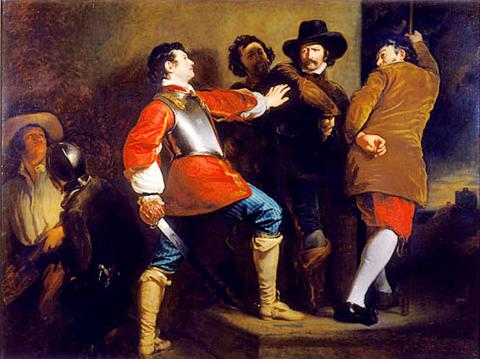Chinese practice
人贓俱獲
be caught red-handed

Photo: Wikimedia Commons
照片:維基共享資源
(ren2 zang1 ju4 huo4)
拉丁文「flagrante delicto」為法律術語,字面意思是「在犯罪的當下」,有時縮寫為「in flagrante」,用來表示在犯罪的時候被逮住。另一種說法是「with the crime still blazing」(罪行仍眾目昭彰)。名詞「delictum」表示犯罪,而「blazing」一字此處並非指「著火」,而是隱喻公然、清晰可見的行動。「a flagrant abuse of power」(公然濫用權力)中的「flagrant」(明目張膽的)一字,亦表示公然可見之行動,一七○六年在英文中首次出現,可能源自法律術語。
如果你跟法律界以外的人說,你曾經逮過某人「in flagrante delicto」,或說「flagrans delictum」這句話,他們可能根本不知你在說什麼。
蘇格蘭人並未用拉丁法律術語來表示現行犯的逮捕,而是用一種更淺顯易懂的隱喻:偷獵者或兇手沾滿血腥的手。此說法始於十五世紀。一四三二年詹姆士一世的「蘇格蘭議會法案」中,使用了「red-hand」(紅手)一詞。蘇格蘭律師喬治‧麥肯齊(一六三六~一六九一)在其一六七四年的《蘇格蘭刑事問題之法律及慣例論》中寫道:「If he be not taken red-hand the sheriff cannot proceed against him」(如果他不是被當場逮獲,那麼行政司法長官就無法對他進行法律制裁)。
此語最後演變為形容詞「red-handed」,成為「to be caught red-handed」這說法。此演變分為兩個階段。
首先,蘇格蘭作家及詩人華特‧司各特爵士(一七七一~一八三二)一八一九年小說《撒克遜英雄傳》中有一句話:「I did but tie one fellow, who was taken redhanded and in the fact, to the horns of a wild stag」(我只有把那被我當場逮住的人綁在野鹿角上)。此即為「red-handed」最早見諸書面。其次,喬治‧阿弗雷‧勞倫斯(一八二七年~一八七六年)一八五七年的小說《Guy Livingstone; or, ‘Thorough’》(蓋伊‧利文斯通;又名「徹頭徹尾」),是「caught red-handed」一語首次被引用:
「我同伴撿起了這東西,他們追過來的時候,我們只來得及搞清楚這是個手搖鐘柄和名牌 ──六七個警察和特務追來,還有一大群大人和小孩。我們很快就被抓住了。我們手上拿著東西,這事實構成我們的『flagrans delictum』──『人贓俱獲』(caught “red-handed”)。」
明末凌濛初(一五八○~一六四四)所著之短篇小說集《初刻拍案驚奇》第三十六卷中,有此一句:「牛公取筆請張生一一寫出,按名捕捉,人贓俱獲,沒一個逃得脫的」。成語「人贓俱獲」便是由此而來,字面意思是「人和被盜物品一起被捕獲」。用台語可以說是「被抓包」。犯罪時被當場逮獲的人,便是法律術語所說的「現行犯」。
(台北時報林俐凱譯)
對於走私的指控,他雖然矢口否認,但當場人贓俱獲,讓他無法狡辯。
(As far as the charge of smuggling was concerned, despite his denials, he was caught red-handed, and so doesn’t have a leg to stand on.)
刑事訴訟法允許任何人對現行犯都可以逮捕,理由是現行犯罪證明顯,不至於發生權力濫用的情事。
(The Code of Criminal Procedure permits anyone to arrest someone caught red-handed, the reason being that the guilt is quite evident, and so the arrest will not constitute a contravention of that person’s rights.)
英文練習
be caught red-handed
As a legal term, the Latin phrase in flagrante delicto, literally meaning "in blazing offence,” sometimes shortened to in flagrante (“in blazing") is used to indicate that a criminal has been caught in the act of committing an offense. Another way of putting it would be to say "with the crime still blazing." The noun delictum means offense; “blazing” here does not mean “on fire,” it is more a metaphor for a blatant, clearly visible action. In the latter sense, the use of the word “flagrant,” as in “a flagrant abuse of power” was first recorded in English in 1706, and was probably derived from the legal term.
If you told anybody outside of the courtroom that you had caught somebody in flagrante delicto, or used the phrase flagrans delictum however, they would probably have no idea what you were talking about.
The Scots didn’t use the Latin legal term when referring to criminals being caught in the act: from the 15th century on they used a more easily recognizable metaphor for somebody — perhaps a poacher or a murderer — still, and quite literally, with blood on their hands. In the Scottish Acts of Parliament of James I, dating to 1432, the term “red-hand” is used. In the 1674 work A Discourse Upon the Laws and Customs of Scotland in Matters Criminal, the Scottish lawyer Sir George Mackenzie of Rosehaugh (1636 – 1691) wrote "If he be not taken red-hand the sheriff cannot proceed against him.”
Eventually, this phrase would evolve into the adjective “red-handed,” giving us the phrase “to be caught red-handed.” This evolution came in two stages.
First, the 1819 novel Ivanhoe by the Scottish writer and poet Sir Walter Scott (1771 – 1832) had the line "I did but tie one fellow, who was taken redhanded and in the fact, to the horns of a wild stag.” This is the earliest known printed version of “red-handed.” Second, in George Alfred Lawrence’s (1827 – 1876) 1857 novel Guy Livingstone; or, ‘Thorough’, we find the first known citation of the phrase “caught red-handed”:
“My companion picked up the object; and we had just time to make out that it was a bell-handle and name-plate, when the pursuers came up — six or seven ‘peelers’ and specials, with a ruck of men and boys. We were collared on the instant. The fact of the property being found in our possession constituted a ’flagrans delictum’ — we were caught ‘red-handed.’"
In Chapter 36 of the late Ming Dynasty collection of short stories Slapping the Table in Amazement Part 1 by Ling Mengchu (1580–1644), we read the line 牛公取筆請張生一一寫出,按名捕捉,人贓俱獲,沒一個逃得脫的 (Mr Niu took a brush and asked Zhang to write down their names, one by one, and they were seized, caught with the spoils on their person: not one of them got away). From this we get the phrase 人贓俱獲, literally meaning “person and stolen goods apprehended together.” In Taiwanese you can say that somebody 被抓包 (they were caught in the act). The legal term in Chinese for a person having been caught red-handed is 現行犯.
(Paul Cooper, Taipei Times)
It’s pretty much an open and shut case. She was caught red-handed. I don’t think the trial will go on for very long.
(這案子辦起來應該很單純,因為她是現行犯,所以我不覺得這案子會審很久。)
The police are maintaining 24-hour surveillance on them. If they are going to prove their involvement, they will have to catch them red-handed.
(警方對他們二十四小時全天候監控。如果要證明他們涉案,得要人贓俱獲。)

A: Hard rock band Guns N’ Roses is touring Taiwan tomorrow. What about pop diva Lady Gaga? B: Unfortunately, Singapore has once again exclusively secured Gaga’s concerts in Asia, just like Taylor Swift’s exclusive Asian shows last year. A: The Singaporean government reportedly paid up to US$2.2 million to secure Swift’s shows. B: And the shows did boost its economy and tourism. A: But I’m angry about this approach, so I’m not going to Gaga’s shows this time. A: 硬式搖滾天團槍與玫瑰明天即將來台,流行天后女神卡卡呢? B: 真可惜,新加坡再度取得卡卡亞洲巡演的獨家主辦權,就像去年泰勒絲的亞洲獨家演出一樣。 A: 據報導新加坡政府付出高達220萬美元,取得泰勒絲的亞洲獨家主辦權。 B: 而她的秀也的確提振了該國的經濟和旅遊業。 A: 但我對此還是很不爽,所以不去新加坡看卡卡了! (By Eddy Chang, Taipei Times/台北時報張迪)

A: Hard rock band Guns N’ Roses and pop diva Lady Gaga are finally touring Asia again. B: Are they also coming to Taiwan? A: The band will stage a show at the Taoyuan Sunlight Arena on Saturday. B: Wow, so this will be the band’s third visit. I really love its 1992 power ballad “November Rain.” The nine-minute hit was the Billboard chart’s longest song at one point. A: Let’s go celebrate the 40th anniversary of its release. A: 硬式搖滾天團槍與玫瑰、女神卡卡終於再度展開亞洲巡演了。 B: 他們也會來台巡演嗎? A: 槍與玫瑰本週六即將在桃園陽光劇場開唱唷。 B: 哇這將是該團第三次來台演出,我超愛他們1992年強力情歌《November Rain》,全長近9分鐘還曾是告示牌排行榜最長神曲。 A: 那我們一起去慶祝該團出道40週年吧! (By Eddy Chang, Taipei Times/台北時報張迪)

If you could nominate any toys for the Toy Hall of Fame, what would they be? Iconic playthings like yo-yos, toy cars, or video games seem like obvious __1__. Classic toys such as jacks, playing cards, and board games like Chess, Monopoly, and Uno have brought endless joy to generations. Overall, there are countless toys that __2__ in the Toy Hall of Fame. The National Toy Hall of Fame was __3__ in 1998 at The Strong National Museum of Play in Rochester, New York. The Toy Hall of Fame aims to __4__ items that have been cherished for generations, and several

Continued from yesterday(延續自昨日) https://www.taipeitimes.com/News/lang However, not every toy has its moment. Some fans were __8__ that simple classics like balloons—a universal symbol of celebrations—haven’t made the cut yet. With their lightweight charms and transformative puffs of air, balloons have __9__ millions for decades and will have to wait at least another year for a chance to be inducted. As the Toy Hall of Fame continues to celebrate toys that __10__ creativity and joy, we can only wonder which treasures will earn a spot next. Will the widely adored balloon finally take its place in 2025? Only time will tell, but one thing is